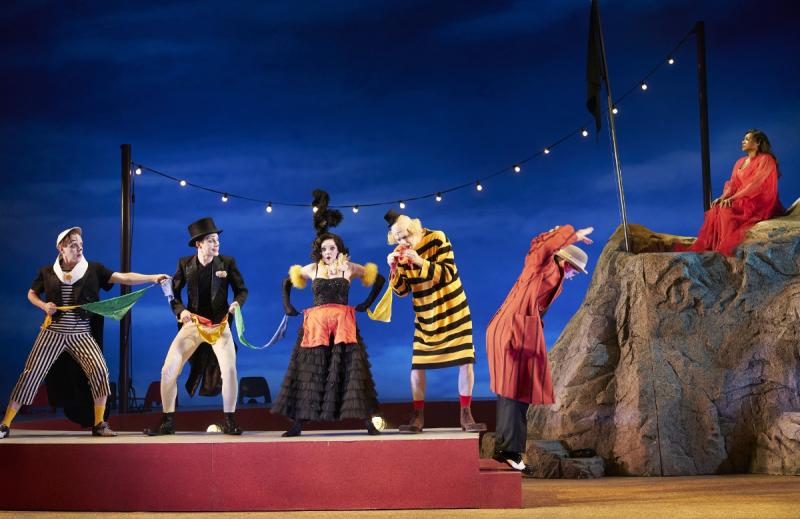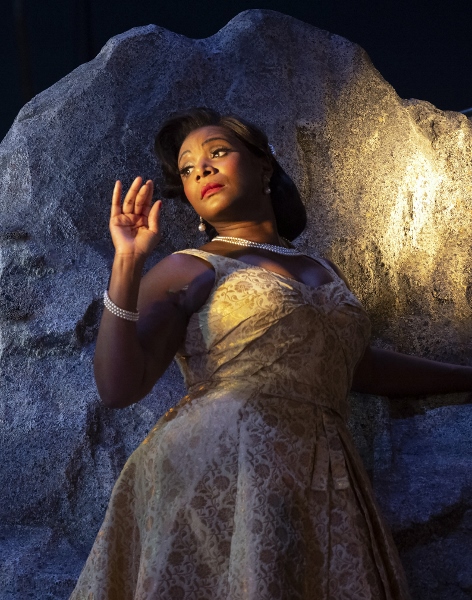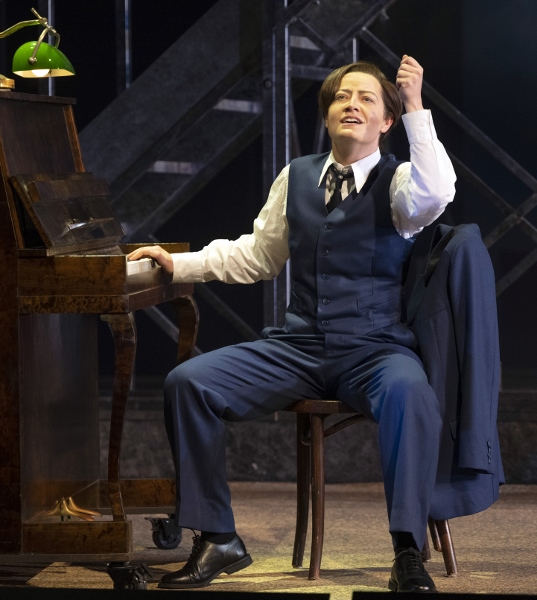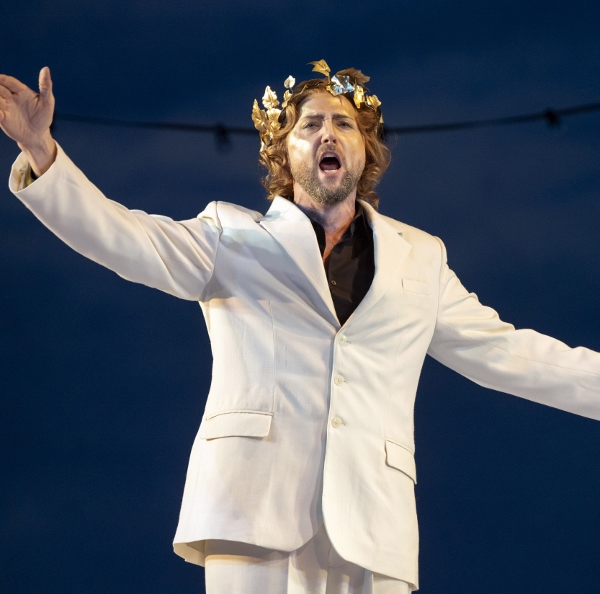Ariadne auf Naxos, Opera North review - funny and beautifully sung | reviews, news & interviews
Ariadne auf Naxos, Opera North review - funny and beautifully sung
Ariadne auf Naxos, Opera North review - funny and beautifully sung
Genre-busting opera with some of Strauss’s most glorious and demanding vocal writing

Rodula Gaitanou’s production of Richard Strauss’s Ariadne auf Naxos is a hugely entertaining treatment of an opera that brings its fair share of problems to any company, and the chief virtue of Opera North’s presentation (a co-production with Gothenburg Opera, now seen in the UK for the first time) is the wonderfully well suited casting.
This is the 1916 version of the piece, the scenario adapted to position the Prologue (the first Act, essentially) in a 20th century film studio (Fellini's, the programme book tells us), rather than a wealthy dwelling in the Vienna of the past.
 Forget the vicissitudes that led to Strauss and Hugo von Hofmannsthal having a second go at their subject (which began as an attempt to marry straight theatre with opera) – there’s enough genre-busting in its incarnation for music theatre performers alone, as Strauss, still fresh from the triumph of Der Rosenkavalier, was keen to show off his ability in Operette style: that being something potentially as demanding of its singers as opera itself, even though amusement and sentimentality were also high on its list of ingredients.
Forget the vicissitudes that led to Strauss and Hugo von Hofmannsthal having a second go at their subject (which began as an attempt to marry straight theatre with opera) – there’s enough genre-busting in its incarnation for music theatre performers alone, as Strauss, still fresh from the triumph of Der Rosenkavalier, was keen to show off his ability in Operette style: that being something potentially as demanding of its singers as opera itself, even though amusement and sentimentality were also high on its list of ingredients.
Gaitanou’s production endeavours to capture the immediacy he sought in mixing singing and parlando speech in the Prologue by having it in a mix of English and German (with some Italian thrown in). We’re on a film sound stage where two movies are in production, one a serious treatment of the mythical story of the abandoned Ariadne, the other a burlesque-style comedy. Financial problems mean that both must be shot simultaneously, with a tight deadline because there’s going to be a firework display at the end of the day, too (pictured above right: Elizabeth Llewellyn as Ariadne).
In this respect the situation is not unlike the Hofmannsthal one, of two companies with two shows for a private patron having to put them on jointly to meet a similar time constraint: the “Maecenas” whose palatial home was the original setting doesn’t sing or speak, but here we see him as the studio boss, complete with entourage, though silent.
The characters of the original are suitably adapted in Gaitanou’s scenario, though the English parts of the text, in Christopher Cowell’s translation, remain remarkably close to its roots, with mentions of “the audience”, and the “entertainment” being planned for “in the garden”. It just about works, though you need to suspend some disbelief. But this is all a fantasy world, anyway – it can’t be taken too seriously, and Strauss’s music carries the day, as it was always meant to. It’s not so much a backstage drama of how opera-making is done (a meme that Donizetti mined in Le Convenienze ed Inconvenienze Teatrali, seen at Buxton International Festival last year as Viva la Diva, and Charles Edwards used for Opera North’s Pagliacci in 2017) as a dream of how it might be in La-La Land, and the important thing is that it’s funny, as well as beautifully sung. In this aspect Opera North have come up with the goods in their ensemble-based approach, with Dean Robinson and John Savournin leading the way in the Prologue and Jeremy Peaker making a telling contribution.
 Guest artists are equally well fitted. Hanna Hipp makes a powerful fist of The Composer (pictured left), which is a soprano trouser role and carries some musical weight (remember this is Richard Strauss, who took these things seriously even when in comedy mode). She sang “You Venus’ boy” (Du Venus’ Sohn) with beautiful, gently floated tone, and rose to real heights for her later hymn to “the sacred art” of music (Sein wir wieder gut). Elizabeth Llewellyn, also debuting with Opera North, was the Prima Donna and acted in appropriate style: her big scena was still to come, of course. I wondered whether there was symbolism in the allocation of English or German, or both, to different characters, and concluded that there was no more to it than the idea of a film set as a multi-lingual environment: others may see more, perhaps.
Guest artists are equally well fitted. Hanna Hipp makes a powerful fist of The Composer (pictured left), which is a soprano trouser role and carries some musical weight (remember this is Richard Strauss, who took these things seriously even when in comedy mode). She sang “You Venus’ boy” (Du Venus’ Sohn) with beautiful, gently floated tone, and rose to real heights for her later hymn to “the sacred art” of music (Sein wir wieder gut). Elizabeth Llewellyn, also debuting with Opera North, was the Prima Donna and acted in appropriate style: her big scena was still to come, of course. I wondered whether there was symbolism in the allocation of English or German, or both, to different characters, and concluded that there was no more to it than the idea of a film set as a multi-lingual environment: others may see more, perhaps.
As the burlesque troupe, we first meet Zerbinetta, sung and danced by Jennifer France delightfully (and with her greatest scene also still to come), and then Truffaldino, brilliantly acted by John Savournin, Harlequin (Dominic Sedgwick), Scaramuccio (Alex Banfield) and Brighella (Adrian Dwyer).
The “opera” proper (second Act, effectively) is where the leading singers have their chances to explore some of Strauss’s most glorious, and demanding, writing for the voice. In staging, it’s very much as in the original scenario – two shows concertina’d into one – except that in this production there are film cameras and lights around the edge of the stage, and Bacchus (who’s going to be Ariadne’s love, once they’ve each sorted out their mistaken apprehension of who the other is) makes his entrance on a sound stage gantry – a genuine deus ex machina! We also see the Composer still very much around (though silent) and very much fallen for the charms of Zerbinetta, giving the love interest of the plot a neat double quality. And at the close there really are fireworks – a happy ending to beat all happy endings.
The trio of nymphs – Amy Freston (Echo) leading them in movements that might be those of water-borne Rhinemaidens in another context, with Daisy Brown (Naiad) and Laura Kelly-McInroy (Dryad) – are nicely matched for height and build, sing sweetly, and play their parts alongside the burlesque artistes adroitly.
Elizabeth Llewellyn sang her tragic “Es gibt ein Reich” gloriously, and the quality of her gorgeous low register is one of the phenomena of this show that sticks in the memory, but it was Jennifer France’s “Grossmächtige Prinzessin”, top Ds and all, that stole the show on the first night, bringing her the first spontaneous applause of the evening.
 But the final love duet, sometimes criticised for prolixity and for merely pulling the same levers as the final pages of Rosenkavalier, proved the inspired quality of the cast Opera North have gathered for this production. Ric Furman (Bacchus, pictured right) is a tenor of the quality that Strauss must have often longed for: heroic and passionate together, and convincing in godlike appearance, he made the ideal partner for Llewellyn, and they gave the finale the vocal splendour that provides a treat for the listener and goes a long way to proving that the real composer of Ariadne auf Naxos had certainly not gone into auto-pilot.
But the final love duet, sometimes criticised for prolixity and for merely pulling the same levers as the final pages of Rosenkavalier, proved the inspired quality of the cast Opera North have gathered for this production. Ric Furman (Bacchus, pictured right) is a tenor of the quality that Strauss must have often longed for: heroic and passionate together, and convincing in godlike appearance, he made the ideal partner for Llewellyn, and they gave the finale the vocal splendour that provides a treat for the listener and goes a long way to proving that the real composer of Ariadne auf Naxos had certainly not gone into auto-pilot.
It was of course down to Antony Hermus’s conducting that the whole show took wings, and the orchestral playing was sumptuous and finely disciplined. The principal guest conductor role created for him by Opera North only relatively recently is already paying rich dividends, and it’s gratifying to see that his work in 2018, conducting what was then Opera North’s new Tosca (now in repertoire with this and The Cunning Little Vixen), was, as I hoped then, so very well received.
- Ariadne auf Naxos at Leeds Grand Theatre on 21 and 24 February and 1 March. Further performances in Salford, Nottingham, Newcastle and Hull
rating
Explore topics
Share this article
Add comment
The future of Arts Journalism
You can stop theartsdesk.com closing!
We urgently need financing to survive. Our fundraising drive has thus far raised £49,000 but we need to reach £100,000 or we will be forced to close. Please contribute here: https://gofund.me/c3f6033d
And if you can forward this information to anyone who might assist, we’d be grateful.

Subscribe to theartsdesk.com
Thank you for continuing to read our work on theartsdesk.com. For unlimited access to every article in its entirety, including our archive of more than 15,000 pieces, we're asking for £5 per month or £40 per year. We feel it's a very good deal, and hope you do too.
To take a subscription now simply click here.
And if you're looking for that extra gift for a friend or family member, why not treat them to a theartsdesk.com gift subscription?
more Opera
 Tosca, Welsh National Opera review - a great company reduced to brilliance
The old warhorse made special by the basics
Tosca, Welsh National Opera review - a great company reduced to brilliance
The old warhorse made special by the basics
 BBC Proms: The Marriage of Figaro, Glyndebourne Festival review - merriment and menace
Strong Proms transfer for a robust and affecting show
BBC Proms: The Marriage of Figaro, Glyndebourne Festival review - merriment and menace
Strong Proms transfer for a robust and affecting show
 BBC Proms: Suor Angelica, LSO, Pappano review - earthly passion, heavenly grief
A Sister to remember blesses Puccini's convent tragedy
BBC Proms: Suor Angelica, LSO, Pappano review - earthly passion, heavenly grief
A Sister to remember blesses Puccini's convent tragedy
 Orpheus and Eurydice, Opera Queensland/SCO, Edinburgh International Festival 2025 review - dazzling, but distracting
Eye-popping acrobatics don’t always assist in Gluck’s quest for operatic truth
Orpheus and Eurydice, Opera Queensland/SCO, Edinburgh International Festival 2025 review - dazzling, but distracting
Eye-popping acrobatics don’t always assist in Gluck’s quest for operatic truth
 MARS, Irish National Opera review - silly space oddity with fun stretches
Cast, orchestra and production give Jennifer Walshe’s bold collage their all
MARS, Irish National Opera review - silly space oddity with fun stretches
Cast, orchestra and production give Jennifer Walshe’s bold collage their all
 Káťa Kabanová, Glyndebourne review - emotional concentration in a salle modulable
Janáček superbly done through or in spite of the symbolism
Káťa Kabanová, Glyndebourne review - emotional concentration in a salle modulable
Janáček superbly done through or in spite of the symbolism
 Buxton International Festival 2025 review - a lavish offering of smaller-scale work
Allison Cook stands out in a fascinating integrated double bill of Bernstein and Poulenc
Buxton International Festival 2025 review - a lavish offering of smaller-scale work
Allison Cook stands out in a fascinating integrated double bill of Bernstein and Poulenc
 Tosca, Clonter Opera review - beauty and integrity in miniature
Happy surprises and a convincing interpretation of Puccini for today
Tosca, Clonter Opera review - beauty and integrity in miniature
Happy surprises and a convincing interpretation of Puccini for today
 Hamlet, Buxton International Festival review - how to re-imagine re-imagined Shakespeare
Music comes first in very 19th century, very Romantic, very French operatic creation
Hamlet, Buxton International Festival review - how to re-imagine re-imagined Shakespeare
Music comes first in very 19th century, very Romantic, very French operatic creation
 Falstaff, Glyndebourne review - knockabout and nostalgia in postwar Windsor
A fat knight to remember, and snappy stagecraft, overcome some tedious waits
Falstaff, Glyndebourne review - knockabout and nostalgia in postwar Windsor
A fat knight to remember, and snappy stagecraft, overcome some tedious waits
 Salome, LSO, Pappano, Barbican review - a partnership in a million
Asmik Grigorian is vocal perfection in league with a great conductor and orchestra
Salome, LSO, Pappano, Barbican review - a partnership in a million
Asmik Grigorian is vocal perfection in league with a great conductor and orchestra
 Semele, Royal Opera review - unholy smoke
Style comes and goes in a justifiably dark treatment of Handelian myth
Semele, Royal Opera review - unholy smoke
Style comes and goes in a justifiably dark treatment of Handelian myth

Comments
I know Ric Furman, and he is